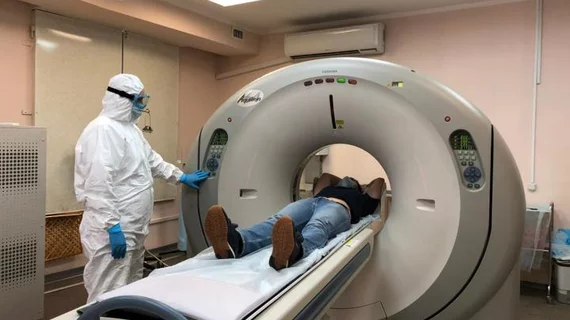Experts cast further doubts on COVID chest CT: ‘Not much of a diagnostic role for it’
Imaging experts are casting further doubts about CT’s role in diagnosing COVID-19, even as radiologists in other parts of the world ramp up their own use of the modality.
Chinese researchers detailed these latest reservations in a new retrospective study, published Thursday in the American Journal of Roentgenology. Comparing computed tomography findings for 52 patients with COVID-19 pneumonia up against 45 more with the influenza-virus form of the lung infection, investigators struggled to differentiate.
“Distinguishing between these two types of viral pneumonia with imaging alone is difficult. Therefore, CT examination needs to be combined with clinical indicators for comprehensive evaluation,” concluded Liaoyi Lin, MD, with the Department of Radiology at the First Affiliated Hospital of Wenzhou Medical University, and colleagues. “The more important role of CT in the pandemic is in finding lesions and evaluating effects of treatment,” the team added.
Overall, Lin et al. noted no significant difference in CT score, length of the largest lesion, mean density, volume or mass of lesions between the two study groups. With manifestations of COVID and the influenza virus overlapping so frequently, they wrote, “even with the characteristics evaluated using AI software, no significant differences were detected.”
The findings are no surprise after U.S. imaging experts for months have been questioning CT’s role in diagnosing the virus. The American College of Radiology sounded the alarm back in march that computed tomography should not be used as a first-line test for COVID-19, given concerns about specificity.
“There was a perceived role for CT in the early days of COVID before we had access to a reliable PCR test," Robert Dickson, MD, of the University of Michigan in Ann Arbor, told Medpage Sunday in commenting on the AJR study. "I believe it was widely used in the early Wuhan outbreak for this reason. But in our current experience, given the availability of molecular testing, there is not much of a diagnostic role for it, especially given the lack of COVID-specific findings (as is supported by this study)."
Despite these concerns, radiologists in other countries continue to deploy CT as a means to diagnose the novel disease. That includes Russia, where the Moscow government and local Center for Diagnostics and Telemedicine have partnered to launch a network of outpatient CT centers to pinpoint the virus. In a recent announcement, Russian researchers claimed CT logged a sensitivity rate of 98%.
Meanwhile in India, doctors have sparred over the use of chest CT to screen every patient hospitalized for non-COVID treatment in select private hospitals. Following recent protests from both patients and doctors, some hospitals have slashed CT prices in half to allay some of these concerns, the Times of India reported Thursday.
The Indian College of Radiology and Imaging recently issued guidance, urging against chest CT for screening, similar to the ACR. And some docs in the country are “livid” about the continued use of imaging, despite the mounting evidence. “It may be one more example of profiteering from an epidemic,” one senior physician told the newspaper.

